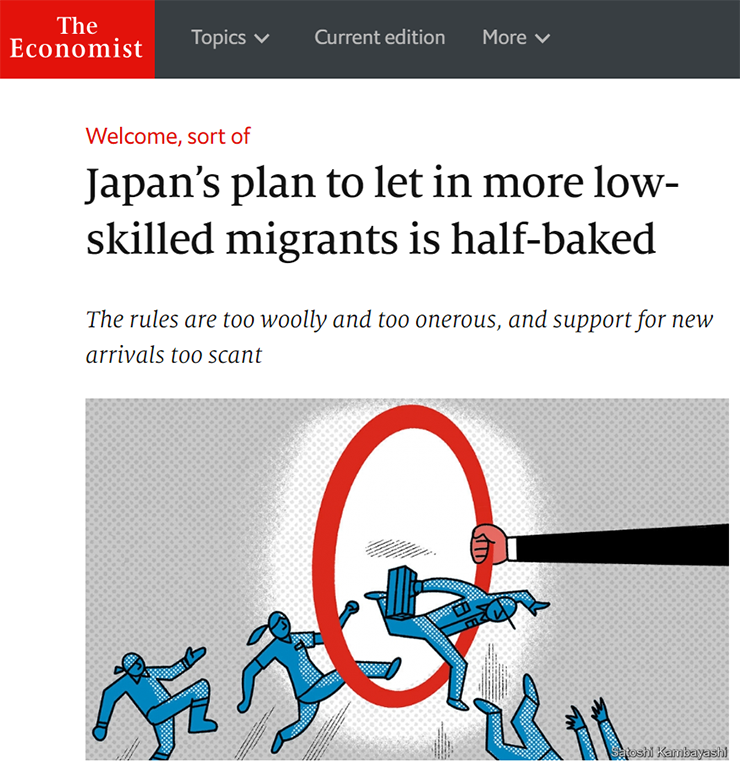
Print edition | Asia
Feb 28th 2019| GIFU
Cho lan spreads out papers on the table as she explains that her job, sewing women’s clothing at a small factory in Gifu, a prefecture in central Japan, was based on lies. The 51-year-old Chinese worker came to Japan in 2015 on a foreign-trainee visa, hoping to earn a higher salary. But she says the details on her pay-slips bear no relationship to the number of hours worked (which she meticulously documented in notepads and with videos of the factory clock) or the pay she received. “I feel very tricked,” she says. Her story is echoed by many like her, says Ken Kai, the (also Chinese) head of a shelter in Gifu where Ms Cho is now staying.
From April Japan will for the first time openly accept low-skilled workers in certain industries facing labour shortages. That will remove one of the lies from stories like Ms Cho’s: neither she nor the firm she worked for believed she was a trainee (she had 20 years of experience in her field). Japanese firms have long used that scheme, on paper designed to give workers from poor countries the chance to develop skills to take home, to recruit low-skilled workers. Others enter the country on visas meant for students or people of Japanese descent. Now they will be able to come honestly. Workers will be able to change jobs, which they could not under the trainee scheme. And although Shinzo Abe, Japan’s prime minister, often states that they will not be able to bring their families or stay indefinitely, the new visa in fact opens up a path to both.
But the scheme does not resolve all the complaints of low-skilled migrants. “The politicians did not debate the power imbalance that causes the issues,” says Ippei Torii of the Solidarity Network with Migrants Japan, an ngo. Yoshihisa Saito of Kobe University reckons that in reality workers will struggle to change jobs. They will, for example, be allowed to move only within the same industry. Foreign workers also depend more heavily on their employer than in other countries, for example for help getting housing. Many landlords will not rent to foreigners, and the ones who do require a guarantor.
Too little is being done to tackle many of the problems facing low-skilled workers in Japan, says Yuichiro Tamaki, the head of the opposition Democratic Party for the People. It is not uncommon for migrants to do too much overtime or to be underpaid. (Ms Cho says she often worked from 6am to midnight). Companies often get away with breaking laws, such as not paying the minimum wage. It does not help that the most desperate demand for foreign workers is in rural areas, where bosses are not always aware of laws, says Misa Matsuzaki, who runs Work Japan, a job site for blue-collar foreign workers.
It is unclear how the government will stamp out other problems, such as physical and verbal abuse, or the use of dodgy brokers. There are only a handful of support centres and hotlines for complaints, many run by ngos. Much of the new law is unclear, says Mr Saito. The government says, for example, that companies must help workers learn Japanese. Yet it remains to be decided exactly what that means. As a foreigner it can be difficult to do simple things like get a mobile phone or open a bank account, says Ms Matsuzaki.
Getting workers to Japan in the first place could be hard, too. They must pass two exams, to show job-relevant skills and some degree of proficiency in Japanese. Officials admit that many of the necessary foreign test centres have yet to be set up, and that tests may be too difficult to attract the 350,000-odd workers Japan reckons it needs over the next five years. In February Japan said it would lower the Japanese-language requirements for nursing-care workers admitted under the trainee scheme, as fewer had come than expected.
“If my issue gets resolved, I would think about continuing to work here,” says Ms Cho–the money is good. “But all my friends and family at home say to come back home; that working here is bad.” Even some government officials admit that the law was enacted in haste, because of pressure from business. If Japan wants to end its labour shortage, it needs to ensure that migrants are treated decently.
This article appeared in the Asia section of the print edition under the headline “Welcome, sort of”




